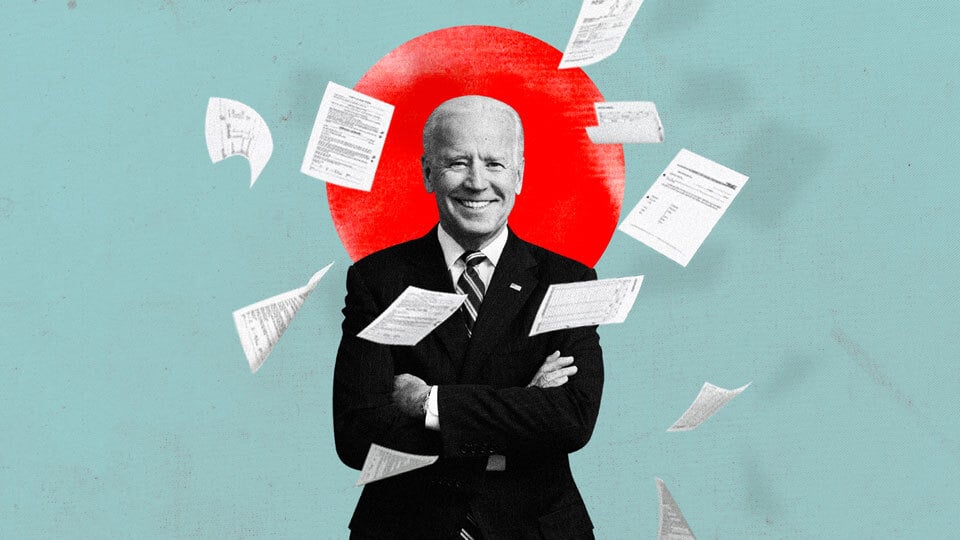
- The U.S Senate has passed a $1 trillion infrastructure bill, the biggest domestic spending bill in a decade.
- The Biden administration urged Democrats to speed up to include additional tax compliance rules for cryptocurrency transactions in the upcoming $3.5 trillion budget reconciliation package.
- The Treasury Department has previously announced that it will require any transfer of $10,000 and more to be reported to the IRS.
Just a while ago the crypto world was shaken by the news of a crypto tax provision embedded within the U.S. Senate’s $1 trillion infrastructure bill.
Even though the infrastructure bill sparked what some called “productive” discussion between the crypto community and the governors, there were no positive adjustments made for crypto taxation requirements.
However, this is not the end of the bad news for the crypto community.
Sponsored
The Biden administration is urging Democrats to include more rules for cryptocurrency transactions and tax compliance in the upcoming $3.5 trillion budget reconciliation package.
What Does This Mean?
According to an administration official, the administration hopes to add to the filibuster-proof package requirements that cryptocurrency companies must provide data about foreign account holders so the U.S. can share information with global trading partners.
The proposal, included in Treasury Department revenue proposals released earlier this year, would allow U.S. officials to automatically share information in exchange for data on U.S. taxpayers trading digital currencies in other countries, which the government would use to enforce tax compliance.
Sponsored
A separate infrastructure bill passed by the Senate would add cryptocurrency exchanges and others that facilitate transactions in Bitcoin, Ethereum and a variety of other virtual tokens to the definition of “brokers,” which must report capital gains and losses to the IRS and to customers. The Treasury proposal, which Congress has yet to take up, would extend the reporting requirements to “beneficial owners” behind legal business structures set up by foreign account holders to buy and sell cryptocurrencies.
None of that is included in the spending package as it stands; it still requires all 50 Democratic votes in the Senate to pass.
A Quick Recap of the Bill and Crypto
Recently lawmakers drafted a bipartisan infrastructure bill in Congress suggesting raising $28 billion over the next decade in extra crypto taxes by employing new information-reporting requirements on providers of crypto services and exchanges.
The rule stated that cryptocurrency brokers should report traders’ information to the IRS that includes purchase and sales prices, transfers between brokers and transactions of more than $10,000.
However, the biggest issue for most was a broad use of the term “broker’’, which required further specification. The Senators have offered two competing amendments, seeking to specify the term “broker.”
Definitions and Confusions
Crypto think tank Coin Center and advocacy group Blockchain Association spoke out against the $1 trillion infrastructure package that the House of Representatives is scheduled to vote on in September. That bill included a last-minute provision that redefined those who trade digital assets as “brokers” and made them responsible for sharing tax information with the IRS.
Both sides have agreed to clarify the underlying text to ensure that those not acting as brokers aren’t going to be sucked up into definition.
Now, according to the “Cryptocurrency Tax Clarity Act” the term “broker” includes any person solely engaged in the business of,
“Validating distributed ledger transactions, without providing other functions or services, or selling hardware or software for which the sole function is to permit persons to control private keys which are used for accessing digital assets on a distributed ledger.”
The “Effective Date” of the amendments will go into force only after December 31, 2023.
However, the situation is still subject to change as the White House will vote on the overall package at the end of September.
What everyone is awaiting now is to see if there is any movement in the markup process for possible bill modification. So far it looks like there is not much to expect as Nancy Pelosi is dismissing the amendments.
Therefore, there are no changes to crypto tax provision. Yet the industry is still hoping that by adding some language during the markup process or introducing some clarifying amendments in a different bill, they can mitigate the impact that the tax provisions are expected to have.
As of right now, exchanges operate on a state by state basis, using money transmission laws without a single federal regulator that oversees issues.
Where is It Heading?
Furthermore, the impact on the market so far might be limited due to the bill’s implementation being far off. The legal actions still need to be negotiated in Congress and signed by President Joe Biden. However, the measures wouldn’t become fully effective until 2023.
The biggest question so far is how the language of the bill will be changed?
On The Flipside
- It is only a matter of time until the world sees what effect the infrastructure bill will have on crypto. As some senators have admitted, having little knowledge about digital assets they were essentially not in the position to make legislation on crypto taxation.
- A debate over crypto taxation, in reality, was between politicians who understand how the technology works and those who don’t, instead of a debate between opposing parties.
- The silver lining behind working on this amendment is that members are now becoming more aware of the significance of this industry. We can only hope that governors will continue to gather better understanding of the blockchain industry, thus implementing more appropriate legislation.
Why You Should Care?
If you are a cryptocurrency trader, regulations like this will affect those living in the USA and the rest of the world doing business in the US. It could hit miners, validators, and people who prepare software and hardware for digital wallets. Staying on top of things would only help you navigate the trading and mining process along the way.